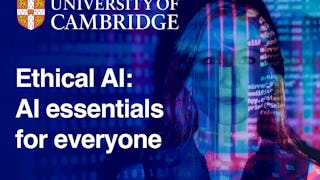The primary objectives of this course are to introduce concepts around defining AI and problematizing it's regulation, doing both from a philosophical standpoint. In this course, you'll be introduced to basic philosophical methods and have the opportunity to practice with logical statements. This practice will help you as you critically evaluate arguments for validity and soundness while forming your own opinion on the ethics of AI and AI regulation.
通过 Coursera Plus 解锁访问 10,000 多门课程。开始 7 天免费试用。


您将获得的技能
要了解的详细信息
了解顶级公司的员工如何掌握热门技能

该课程共有4个模块
This module provides a thematic overview of course content and introduces various philosophical concepts and tools to aid in thinking about questions of responsible AI. In this module, you will acquire a shared definition of AI as well as a basic overview of philosophy as it relates to this topic.
涵盖的内容
11篇阅读材料2个作业1个应用程序项目2个讨论话题
In this module, you’ll learn more about the philosopher’s tool of argumentation. You will identify types of arguments and practice constructing valid and sound arguments. This will help you, as you evaluate conflicting claims and judge evidence. These skills will be crucial in helping clarify your own thoughts and articulating them clearly.
涵盖的内容
1个视频5篇阅读材料3个作业1次同伴评审1个应用程序项目
In this next module, you will explore normative and prescriptive statements, concepts that are crucial for making informed decisions. Understanding these statements not only deepens your critical reflection on AI, but also empowers you to navigate the increasingly complex landscape of AI regulation. It also outlines some of the existing legal regulatory landscapes related to AI, as exemplified by the General Data Protection Regulation (GDPR), the European Union’s AI Act, the Biden Administration’s Executive Order on Safe, Secure, and Trustworthy Artificial Intelligence, and the AI Safety Institute’s Strategic Vision. During your exploration of regulation frameworks and how to operationalize responsible AI practices, you will consider the ethical and practical implications involved in this technology. Understanding how AI is regulated, and the rationale behind these regulations, is key to making informed choices and engaging in meaningful conversation around regulation concerns in AI.
涵盖的内容
2个视频9篇阅读材料3个作业1个讨论话题
This module summarizes some general questions about regulating AI and more specific questions about the strengths and weaknesses of some current regulatory approaches. In this final module, you’ll utilize the argumentation tools you acquired in previous modules to grapple with some of the big picture questions of regulation: who would be responsible for it and how would it be implemented?
涵盖的内容
9篇阅读材料2个作业1个讨论话题
位教师

从 Philosophy 浏览更多内容
 状态:免费试用
状态:免费试用Fractal Analytics
 状态:预览
状态:预览Fred Hutchinson Cancer Center
 状态:预览
状态:预览Johns Hopkins University
 状态:预览
状态:预览University of Cambridge
人们为什么选择 Coursera 来帮助自己实现职业发展




常见问题
To access the course materials, assignments and to earn a Certificate, you will need to purchase the Certificate experience when you enroll in a course. You can try a Free Trial instead, or apply for Financial Aid. The course may offer 'Full Course, No Certificate' instead. This option lets you see all course materials, submit required assessments, and get a final grade. This also means that you will not be able to purchase a Certificate experience.
When you purchase a Certificate you get access to all course materials, including graded assignments. Upon completing the course, your electronic Certificate will be added to your Accomplishments page - from there, you can print your Certificate or add it to your LinkedIn profile.
Yes. In select learning programs, you can apply for financial aid or a scholarship if you can’t afford the enrollment fee. If fin aid or scholarship is available for your learning program selection, you’ll find a link to apply on the description page.
更多问题
提供助学金,
¹ 本课程的部分作业采用 AI 评分。对于这些作业,将根据 Coursera 隐私声明使用您的数据。




